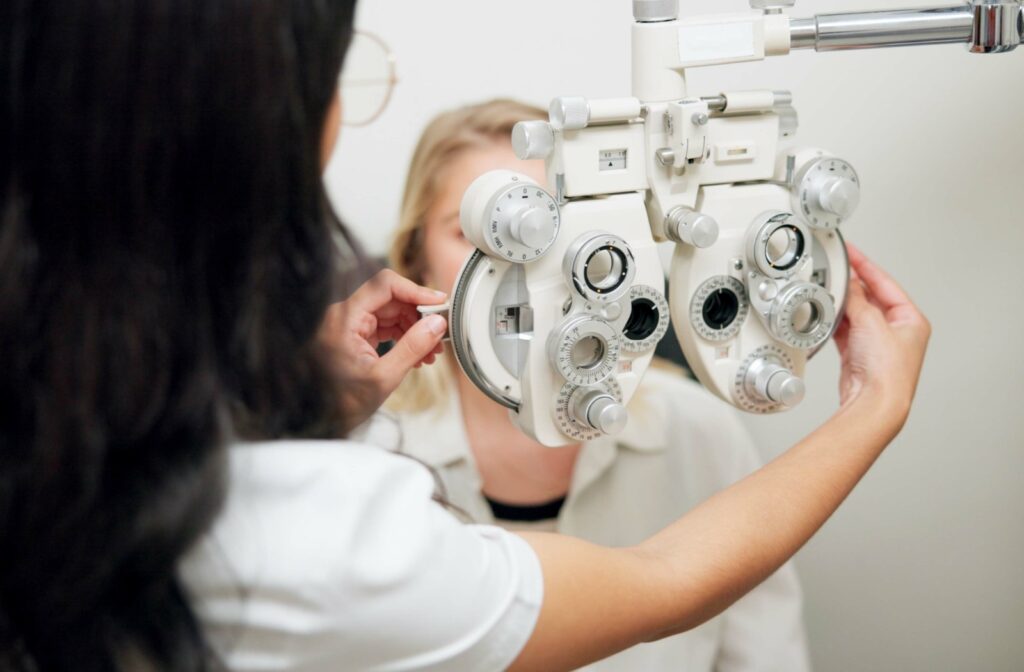In the hustle and bustle of family life, taking care of everyone’s eye health might seem like just another item on the to-do list. However, ensuring that every family member sees clearly can enhance everything from school performance to weekend adventures. The good news is that eye exams can seamlessly fit into even the busiest schedules.
On average, a comprehensive eye exam takes about 30 to 60 minutes, depending on what tests are needed. Whether it’s for you or your child, prioritizing eye wellness with regular eye exams is a simple step toward nurturing a lifetime of healthy vision.
What to Expect During an Eye Exam
When visiting an optometrist for an eye exam, you can expect attentive care to your eye health. The process usually begins with a conversation about your medical history, any current eye issues, and your vision concerns. This helps us tailor the exam to your specific needs.
The heart of the visit is a full eye check-up, which is important for keeping your eyes healthy. The types of tests you need can influence how long your exam takes, but this time is well spent on supporting your eye health.
We may start with a refraction test to see if you need glasses or contacts for clearer vision. This includes reading letters off an eye chart and using a mask-like device called a phoropter to determine your prescription.
Eye exams are more than just vision checks. We have precise diagnostic technology, such as OCT scans and corneal mapping to take a closer look at your eye and spot any issues. We also check eye pressure to screen for glaucoma, which can cause vision loss if not diagnosed early.
Finally, we review the exam findings with you. Your optometrist will discuss any treatment options or the potential need for corrective lenses, and will provide you with a plan for maintaining your vision.
Your Child’s Eye Exam
Children’s eye exams are a proactive step in supporting a child’s education and daily life, as unnoticed vision issues can often arise in these early years. Regular visits to optometrists can help identify and address problems before they affect learning and daily activities. Children’s eye exams are designed to be child-friendly and provide valuable insights for parents, making the process smooth and reassuring.
Much like an adult eye exam, optometrists begin by talking with parents about the child’s medical and vision history, discussing any behaviors that might hint at vision issues. This gives a comprehensive view of the child’s visual health. The exam then moves to a gentle check of the eyes, looking at how they move and align to uncover any hidden concerns.
Depending on your child’s age, we may use different tests to measure their visual clarity. Refraction tests can determine if they need glasses, so we can begin controlling myopia progression if myopia is present.
An eye health evaluation lets us examine the eye’s internal structures. This step helps in identifying conditions like amblyopia (lazy eye) or strabismus (crossed eyes) that may require timely intervention for healthy vision development.
The Importance of Regular Eye Exams for All Ages
Regular eye exams are important for your overall well-being, not just your eyesight. These thorough check-ups help uncover various eye conditions early, which can be crucial for effective treatment.
For kids, regular eye exams help ensure that vision issues don’t go unnoticed. It can be tough to recognize the signs of a vision problem, and children don’t always have the language to explain what’s wrong. Sometimes eye exams are the only way to recognize these issues.
For adults, eye exams can reveal hidden health issues like high blood pressure, diabetes, and high cholesterol, as these conditions can affect the eyes. This becomes even more vital as we age and the likelihood of developing eye conditions like cataracts, glaucoma, and macular degeneration increases.
Ultimately, regular eye exams are a proactive step towards maintaining your vision and health. By prioritizing eye care and scheduling regular visits with your optometrist, you can support the health of your eyes while maintaining your vision.
How Often Should You Have an Eye Exam?
Eye exam frequency depends on age, risk factors, and whether you currently wear glasses or contact lenses.
Children should have their first eye exam between 6–12 months of age, followed by another exam between 3–5 years to get them ready for school. Children’s eyes are constantly changing during their school years, so you should bring them in for a check-up every 12 months.
Adults aged 20–64 with no vision issues should keep up with regular eye exams, though an annual exam is what we recommend. Those aged 65 and older should undergo yearly exams, as the risk for eye conditions increases with age.
Take the Next Step Toward Clear Vision
Maintaining your eye health with regular exams is a simple step towards supporting quality vision. A comprehensive eye exam typically takes only 30 to 60 minutes, making it a quick, yet valuable, investment in your health.
If you’re ready to prioritize your vision, book an appointment with Bluebird Vision + Wellness! Our dedicated professionals are here to help your family achieve and maintain clear, healthy vision.
Don’t wait—start your vision care journey with us today!




